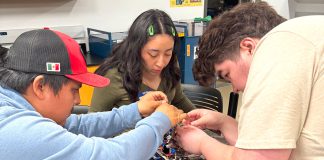
SALINAS — Hartnell Community College’s Governing Board voted unanimously to grant temporary emergency powers to Superintendent/President Patricia Hsieh, during an emergency meeting Wednesday.
All seven district directors were present for the March 18 vote, but the student member was absent.
The action allows Hsieh to respond to the novel coronavirus (COVID-19) threat and to ensure student learning continues. The document states that alternate locations and virtual learning environments are being considered.
The board first voted to accept that the service area for Hartnell is affected by a public health emergency due to COVID-19, and accepted the local and federal declarations of emergency, before moving on to grant emergency powers to their superintendent.
“Our ability to be nimble, quick and responsive is going to be paramount to our ability to ensure the safety and continuation of what we do as a college,” said Board Member Erica Padilla-Chavez.
Padilla-Chavez added that the current situation has agencies across the state and nation having to make decisions everyday given new public health guidelines and emerging data.
“This is a new experience for all of us,” Hsieh said.
She noted that even during the shelter-in-place directives from Monterey County, Hartnell is expected to have staff and faculty provide services.
Hsieh’s temporary emergency powers make it possible for the district to enter into contracts without advertising or inviting bids for necessary projects related to relocation of students and employees, continued instruction, maintenance, operational and instructional materials, and secure bio-hazard prevention.
She is also able to make decisions to relocate students and employees, temporarily transfer work assignments and make decisions on how the college provides alternative education.
Among the decisions from the emergency meeting was how to move forward with staff and faculty work duties.
“Personnel is the largest portion of our expenses,” Padilla-Chavez said.
“We started discussion with staff members identifying key individuals and respective divisions,” Hsieh said. “Can the services be provided remotely or does somebody have to be on site to meet that need?”
The board discussed how the college could move forward with a staff mostly put on paid leave, and how to determine how leave is handled. They went into closed session after the emergency powers decision to enter conference with union labor negotiators.
The temporary emergency powers will remain in effect until rescinded by majority vote of the college’s governing board at a future time.












